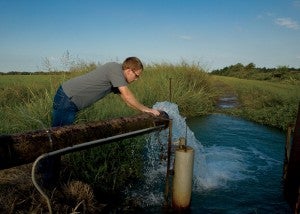Mark Isbell is a rice farmer in Arkansas. He is participating in a pilot project to generate carbon credits by modifying growing practices to reduce the generation of methane and save water.
These practices are being considered by the California Air Resources Board at their meeting on December 18. I asked Mark to tell me why he got involved in this pilot and what it means to growers in his region.
What things did you consider as a part of participating in the agricultural carbon market?
Zero Grade (fields precisely leveled to have no slope) and Alternate Wetting and Drying (AWD) are the primary practices we have implemented. These are the best candidates for creating carbon offsets while also increasing efficiencies in other areas. Careful nitrogen management is another practice. Extra nitrogen not only leads to unnecessary nitrous oxide emissions, but also provides no benefit to the crop. It can actually be detrimental. The key is finding just the right amount of nitrogen. We are open to trying other practices as we move forward, and have some new ideas in development that we believe may add another layer to this.
What are the overall benefits of Zero Grade and Alternative Wetting and Drying?
Zero Grade provides a number of benefits, including more efficient water use (up to 30 percent less) and more efficiency in field work. It also provides many more minimum or no-till opportunities. AWD has the potential of creating another 18 percent in water savings. Saving water also translates to substantial energy savings, which further minimizes environmental impact.
What are the costs and risks associated with adopting these practices?
The primary cost associated with Zero Grade is the cost of putting and keeping the land in the proper shape. AWD also has significant risks. The line between reducing water usage to capture the greatest amount of carbon offset and drying the ground to the point of risking yield reduction is one that requires careful management. Just a 2 percent yield reduction would offset any potential revenue gains from carbon credits. There is a zone you are aiming for, and there is real risk if you don’t hit it.
What is the potential for increasing your bottom line?
Our hope is that it will eventually be substantial, but it will come from multiple angles if it is to work. Carbon offsets alone are not currently high enough to justify the added risk. That will likely change as different states and countries implement new policies. Cost savings from these management practices will also add to the bottom line. Water savings are energy savings, and energy costs money. Reduction in fertilizer also saves money. Finally, the hope is that this could lead to marketing opportunities as the marketplace begins to see the value of sustainable food production.
Duck hunting is very important to the Mid-South culture and economy. How do these practices impact wildlife?
Zero Grade is a substantial benefit to migratory waterfowl since it makes more of the land floodable and creates more resting area. On farm and regional irrigation infrastructure improvements, like the Bayou Meto and White River irrigation projects here in Arkansas, will make AWD possible on wider tracts of land while reducing water usages and improving winter flooding abilities for waterfowl.
What’s needed to make this carbon trading program work effectively for you and other growers?
First of all we have to develop a verification protocol that works well for all involved. We need cost-effective ways to verify these activities in a way that gives them good credibility while not distracting from production. This starts with another round of research on our farm this coming season.

Follow Mark on twitter at @mjisbell.
We also need a transparent marketing process for carbon credits. This could best be done through a resource conservation cooperative created by farmers who implement these practices. This co-op could work to aggregate the credits and employ third-party verifiers to ensure their authenticity.
Finally, I think we need an open mind. This is about being on the front end of something that will benefit all of us. It is worth pursuing, but will require cooperation and openness to change.
What would you tell other rice growers who are considering participating in the carbon market?
It is worth a shot. There are a lot of unknowns, but it is exciting to be a part of something at an early stage. Many growers are concerned about the impact that environmental groups will have on agriculture, and some of that is warranted, but I see this is an opportunity to be a part of creating a market-based approach that works for everyone. We as farmers need to lead this effort, not just react to someone else’s objectives. It is a win-win, but only if we engage and participate.










